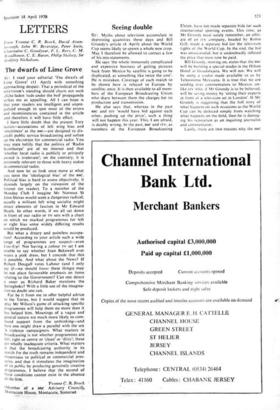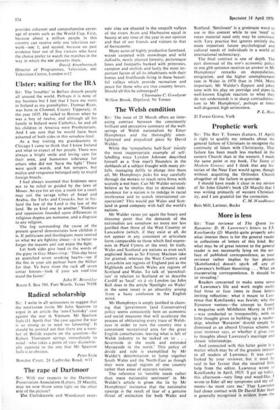Seeing double
Sir: Myths about television accumulate in depressing quantities these days and Bill Grundy's article (4 April) about the World Cup seems likely to spawn a whole new crop. May I therefore be allowed to correct a few of his mis-statements.
He says 'the whole immensely complicated and expensive business of getting pictures back from Mexico by satellite is going to be duplicated, at something like twice the cost'. He is mistaken. Coverage of each match to be shown here is relayed to Europe by satellite, once. It is then available to all mem- bers of the European Broadcasting Union who share between them the charges for its production and transmission.
He also says that, whereas in the past BBC and ITV 'would have bid against each other, pushing up the price', such a thing will not happen this year. This, I am afraid, is doubly wrong. In the past, BBC and Irv. as members of the European Broadcasting Union, have not made separate bids for such international sporting events. This time, as Mr Grundy must surely remember, an affili- ate of an ITV company, headed by Robin Gill, made a separate bid for the television rights of the World Cup. In the end, the bid was unsuccessful, but it undoubtedly inflated the price that must now be paid.
Bill Grundy, moving on, states that the BBC will be building a special studio in the Hilton Hotel at Guadalajara. We will not. We will be using a studio made available to us by Telesistema Mexicana. It is true that we are sending over commentators to Mexico, un- like Iry who, if Mr Grundy is to be believed, will be saving money by 'sitting their experts in front of a television set in London'. If Mr Grundy is suggesting that the full story of what happens on such occasions as the World Cup can be deduced simply from watching what happens on the field, then he is damag- ing his reputation as an inquiring journalist and commentator.
Lastly, there are two reasons why the BBC provides coherent and comprehensive cover- age of events such as the World Cup. First, because about a million people in this country can receive only one television net- work—sac 1; and second, because on past evidence four out of five viewers who have the choice prefer to watch the matches in the way in which the BBC presents them.
David Attenborough
Director of Programmes, Television, BBC Television Centre, London w12







































 Previous page
Previous page